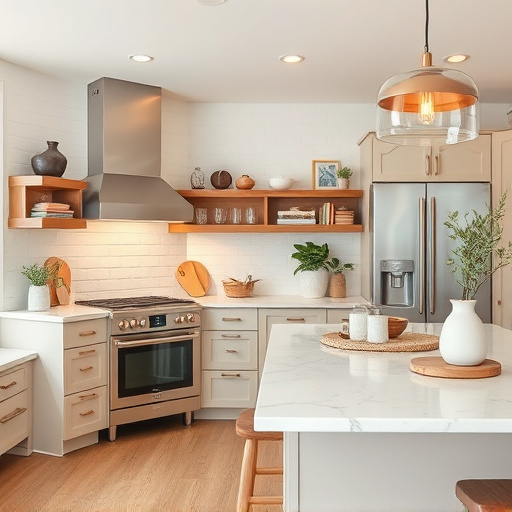Choosing eco-friendly countertops during kitchen renovations significantly reduces environmental impact. Materials like recycled glass, bamboo, and linoleum minimize energy consumption and emissions by utilizing post-consumer waste, renewable resources, and natural components. These sustainable options offer durability, low maintenance, unique aesthetics, and antibacterial properties, catering to busy families' needs. Proper installation techniques, including non-toxic adhesives and ventilation, ensure health and safety while maximizing environmental benefits. Collaborate with green renovation specialists for expert guidance on material compatibility and efficient installation practices.
Transform your kitchen into an eco- oasis with sustainable materials! This guide explores the latest green options for a healthier planet. From countertops made from recycled glass and bamboo to cabinetry crafted from reclaimed wood and energy-efficient appliances, we reveal how to create a stylish, eco-friendly space. Discover the benefits of natural materials, learn installation tips, and explore innovative finishes like cotton textiles and earth-toned paints. Elevate your kitchen renovations with these sustainable choices.
- Choosing Eco-Friendly Countertops for a Sustainable Kitchen
- – Exploring popular sustainable countertop options
- – Benefits of recycled glass, bamboo, and solid wood counters
- – Installation tips and best practices
Choosing Eco-Friendly Countertops for a Sustainable Kitchen
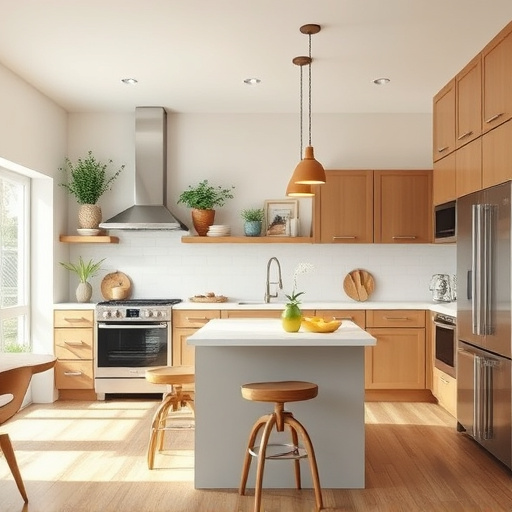
When planning kitchen renovations with an eco-conscious mindset, selecting sustainable countertops is a significant step toward reducing your environmental impact. Traditional countertops often contain materials that are harmful to both people and the planet, such as granite treated with chemical sealers or marble extracted through intensive mining processes. These materials contribute to water pollution and release greenhouse gases during production and transportation.
Opting for eco-friendly alternatives like recycled glass, bamboo, or linoleum offers a more sustainable solution. Recycled glass countertops, for instance, utilize post-consumer waste, reducing the demand for new raw materials and minimizing energy consumption in manufacturing. Bamboo, known for its rapid growth, is highly renewable and produces fewer greenhouse gas emissions compared to traditional wood options. Linoleum, made from natural materials like linseed oil, cork flour, and wood pulp, is not only eco-friendly but also durable and suitable for high-moisture areas like kitchens. These choices not only contribute to a greener kitchen but also create a unique aesthetic that reflects your commitment to sustainable living.
– Exploring popular sustainable countertop options
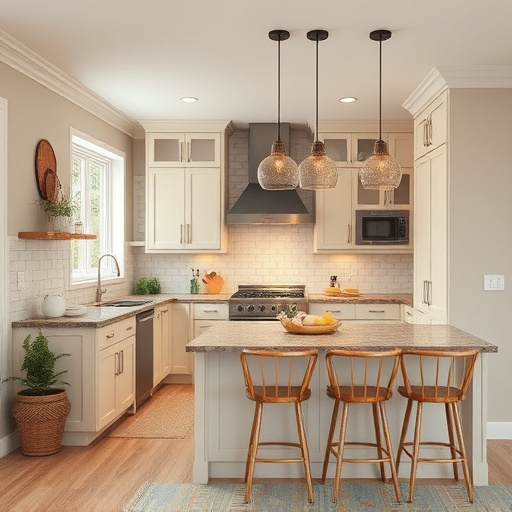
When it comes to kitchen renovations, choosing sustainable and eco-friendly countertops is a smart way to reduce your environmental impact. Popular options include recycled glass, which is made from post-consumer waste and offers a durable, low-maintenance surface. Another favorite is bamboo, known for its rapid growth and natural antibacterial properties, making it an excellent choice for those seeking a unique, visually appealing alternative.
These materials not only contribute to a greener kitchen but also bring modern aesthetics. Recycled glass countertops feature elegant, subtle patterns, while bamboo offers a warm, natural look that complements various design styles. With their long-lasting durability and easy care, these sustainable options are ideal for busy households seeking both style and functionality in their kitchen renovations.
– Benefits of recycled glass, bamboo, and solid wood counters
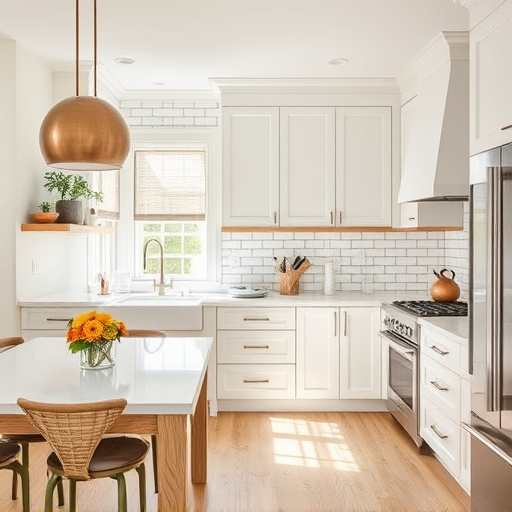
When considering kitchen renovations with an eco-friendly focus, incorporating sustainable materials offers a multitude of benefits for both the environment and your space. Recycled glass, bamboo, and solid wood counters are excellent choices that contribute to a greener lifestyle. Visually appealing and durable, recycled glass countertops are made from post-consumer waste, reducing the demand for new resources and minimizing landfill waste. Their non-porous surface makes them easy to clean and sanitize, ideal for a health-conscious kitchen.
Bamboo and solid wood counters provide warmth and character while promoting sustainability. Bamboo, a rapidly renewable resource, is incredibly strong and durable. It’s a natural choice for those seeking an eco-friendly alternative to conventional materials. Solid wood, when sourced responsibly, adds timeless elegance and can be recycled or reused at the end of its life cycle. Both options offer exceptional workability, allowing for unique designs and customization in kitchen renovations.
– Installation tips and best practices
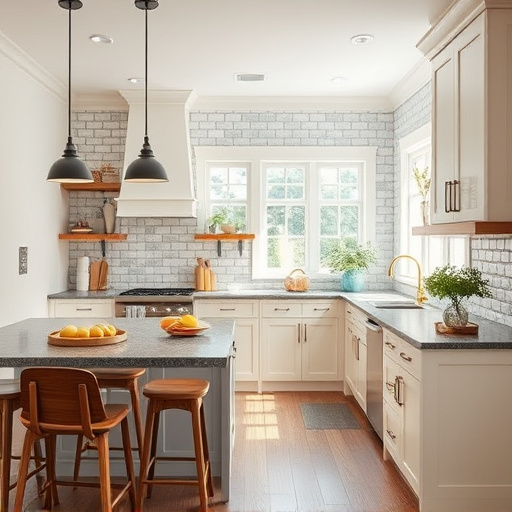
When it comes to sustainable kitchen renovations, proper installation is key. It’s crucial to ensure that eco-friendly materials are seamlessly integrated into your space, maintaining functionality and aesthetics. Best practices include careful planning and measurement to avoid waste; using non-toxic, low-VOC (volatile organic compound) adhesives and finishes; and ensuring proper ventilation during installation to minimize chemical exposure.
Consider working with professionals who specialize in green renovations for expert advice on material compatibility and efficient installation techniques. Remember, the goal is not only to choose sustainable materials but also to install them thoughtfully, maximizing their environmental benefits while enhancing your kitchen’s beauty and performance.
When embarking on kitchen renovations, integrating sustainable and eco-friendly materials is a smart choice that benefits both your space and the planet. By opting for options like recycled glass, bamboo, or solid wood countertops, you contribute to reducing waste, preserving natural resources, and minimizing your carbon footprint. With proper installation and care, these materials offer durability and aesthetic appeal, creating a green kitchen that serves as a testament to your commitment to environmental stewardship.
